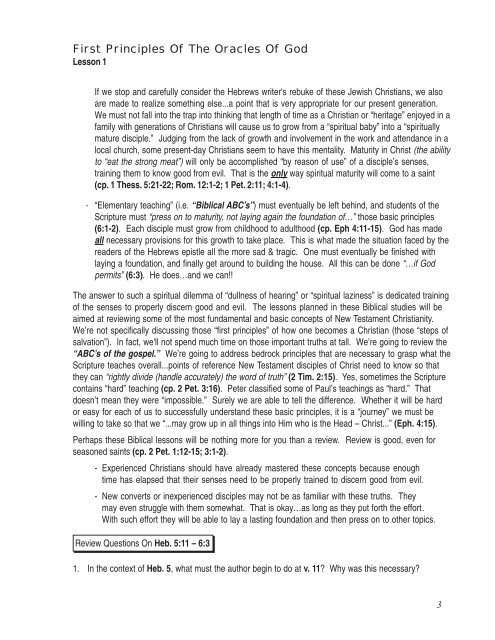Thematic Studies In Bible Basics Lesson 1 - Bible Study Guides
Thematic Studies In Bible Basics Lesson 1 - Bible Study Guides
Thematic Studies In Bible Basics Lesson 1 - Bible Study Guides
You also want an ePaper? Increase the reach of your titles
YUMPU automatically turns print PDFs into web optimized ePapers that Google loves.
First Principles Of The Oracles Of God<br />
<strong>Lesson</strong> 1<br />
If we stop and carefully consider the Hebrews writer's rebuke of these Jewish Christians, we also<br />
are made to realize something else...a point that is very appropriate for our present generation.<br />
We must not fall into the trap into thinking that length of time as a Christian or “heritage” enjoyed in a<br />
family with generations of Christians will cause us to grow from a “spiritual baby” into a “spiritually<br />
mature disciple.” Judging from the lack of growth and involvement in the work and attendance in a<br />
local church, some present-day Christians seem to have this mentality. Maturity in Christ (the ability<br />
to “eat the strong meat”) will only be accomplished “by reason of use” of a disciple’s senses,<br />
training them to know good from evil. That is the only way spiritual maturity will come to a saint<br />
(cp. 1 Thess. 5:21-22; Rom. 12:1-2; 1 Pet. 2:11; 4:1-4).<br />
· “Elementary teaching” (i.e. “Biblical ABC’s”) must eventually be left behind, and students of the<br />
Scripture must “press on to maturity, not laying again the foundation of…” those basic principles<br />
(6:1-2). Each disciple must grow from childhood to adulthood (cp. Eph 4:11-15). God has made<br />
all necessary provisions for this growth to take place. This is what made the situation faced by the<br />
readers of the Hebrews epistle all the more sad & tragic. One must eventually be finished with<br />
laying a foundation, and finally get around to building the house. All this can be done “…if God<br />
permits” (6:3). He does…and we can!!<br />
The answer to such a spiritual dilemma of “dullness of hearing” or “spiritual laziness” is dedicated training<br />
of the senses to properly discern good and evil. The lessons planned in these Biblical studies will be<br />
aimed at reviewing some of the most fundamental and basic concepts of New Testament Christianity.<br />
We’re not specifically discussing those “first principles” of how one becomes a Christian (those “steps of<br />
salvation”). <strong>In</strong> fact, we'll not spend much time on those important truths at tall. We’re going to review the<br />
“ABC’s of the gospel.” We’re going to address bedrock principles that are necessary to grasp what the<br />
Scripture teaches overall...points of reference New Testament disciples of Christ need to know so that<br />
they can “rightly divide (handle accurately) the word of truth” (2 Tim. 2:15). Yes, sometimes the Scripture<br />
contains “hard” teaching (cp. 2 Pet. 3:16). Peter classified some of Paul’s teachings as “hard.” That<br />
doesn’t mean they were “impossible.” Surely we are able to tell the difference. Whether it will be hard<br />
or easy for each of us to successfully understand these basic principles, it is a “journey” we must be<br />
willing to take so that we “...may grow up in all things into Him who is the Head – Christ...” (Eph. 4:15).<br />
Perhaps these Biblical lessons will be nothing more for you than a review. Review is good, even for<br />
seasoned saints (cp. 2 Pet. 1:12-15; 3:1-2).<br />
- Experienced Christians should have already mastered these concepts because enough<br />
time has elapsed that their senses need to be properly trained to discern good from evil.<br />
- New converts or inexperienced disciples may not be as familiar with these truths. They<br />
may even struggle with them somewhat. That is okay…as long as they put forth the effort.<br />
With such effort they will be able to lay a lasting foundation and then press on to other topics.<br />
Review Questions On Heb. 5:11 – 6:3<br />
1. <strong>In</strong> the context of Heb. 5, what must the author begin to do at v. 11? Why was this necessary?<br />
3















